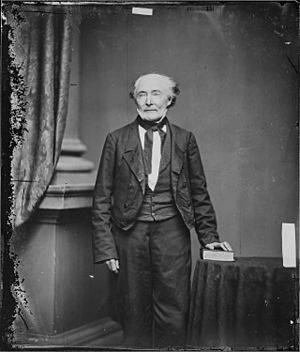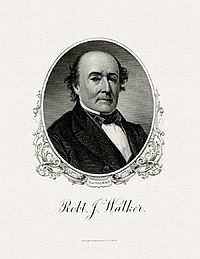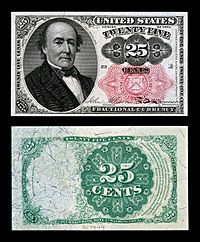Robert J. Walker facts for kids
Quick facts for kids
Robert Walker
|
|
|---|---|
 |
|
| 4th Territorial Governor of Kansas | |
| In office May 27, 1857 – December 15, 1857 |
|
| Preceded by | John W. Geary |
| Succeeded by | James W. Denver |
| 18th United States Secretary of the Treasury | |
| In office March 8, 1845 – March 5, 1849 |
|
| President | James K. Polk Zachary Taylor |
| Preceded by | George M. Bibb |
| Succeeded by | William M. Meredith |
| United States Senator from Mississippi |
|
| In office March 4, 1835 – March 5, 1845 |
|
| Preceded by | George Poindexter |
| Succeeded by | Joseph W. Chalmers |
| Personal details | |
| Born |
Robert John Walker
July 19, 1801 Northumberland, Pennsylvania, U.S. |
| Died | November 11, 1869 (aged 68) Washington, D.C., U.S. |
| Political party | Democratic |
| Spouse | Mary Bache |
| Children | 5, including Duncan |
| Education | University of Pennsylvania (BA) |
Robert John Walker (born July 19, 1801 – died November 11, 1869) was an important American lawyer, economist, and politician. He was a strong member of the Democratic Party.
Walker served as a U.S. Senator for Mississippi from 1835 to 1845. Later, he became the Secretary of the Treasury from 1845 to 1849 under President James K. Polk. For a short time in 1857, he was the Territorial Governor of Kansas. He helped create the bill that led to the United States Department of the Interior in 1849.
As a senator, Walker strongly supported adding Texas to the United States. As Secretary of the Treasury, he managed the money for the Mexican–American War. He also helped create the Walker tariff, which lowered taxes on imported goods. President James Buchanan appointed him Governor of Kansas in 1857. However, he soon resigned because he disagreed with the pro-slavery Lecompton Constitution. After leaving politics, Walker supported the Union during the Civil War and continued to work as a lawyer.
Contents
Early Life and Education
Robert Walker was born in Northumberland, Pennsylvania. His father, Jonathan Hoge Walker, was a judge and a veteran of the Revolutionary War. Robert and his brother Duncan grew up in Bellefonte, Pennsylvania.
Robert went to Bellefonte Academy and then the University of Pennsylvania. He graduated in 1819 at the top of his class. He was also a member of the Philomathean Society.
He married Mary Blechynden Bache Walker. They had five children, including Duncan Stephen Walker. His wife was a great-granddaughter of Benjamin Franklin.
Starting His Career
Walker became a lawyer in Pittsburgh in 1821. He practiced law there until 1826. Then, he moved to Natchez, Mississippi. He joined his brother Duncan Walker in a successful law practice.
Robert and his uncle also invested in cotton, land, and enslaved people. His brother Duncan later moved to Texas. He became involved in land deals and the movement for Texas to become independent.
Serving as a U.S. Senator
Robert Walker became well-known in politics during the Nullification Crisis in 1832. He argued that the federal government had the right to make states follow its laws. In 1836, Walker was elected as a U.S. Senator for Mississippi.
He served in the United States Senate from 1835 to 1845. He was re-elected by a large margin. He also convinced Mississippi lawmakers to speak out against states leaving the Union.
Walker strongly believed in expanding the United States. He supported President Andrew Jackson. He voted to recognize the Republic of Texas in 1837. In 1844, he suggested that Texas should join the U.S. He also worked to get James K. Polk elected president in 1844.
He supported giving government land to new states. He also wanted low taxes on imported goods. This helped farmers in his home state. As a senator, Walker owned enslaved people. He defended slavery but was against the African slave trade. He also favored freeing enslaved people slowly. In 1838, he freed some of his own enslaved people.
Secretary of the Treasury
President Polk chose Walker to be the U.S. Secretary of the Treasury. He served in this role from March 1845 to March 1849. He was a very important member of the President's Cabinet.
Walker wrote an important report in 1845. It argued against high taxes on manufactured goods. The Walker Tariff of 1846 was based on his ideas. He also wrote the bill that created the United States Department of the Interior.
As Treasury Secretary, Walker was in charge of funding the Mexican–American War. He managed the money for the war. In 1848, he authorized payments for a peace treaty with Mexico.
During the war, there were questions about money in the U.S. Treasury. A large amount of funds seemed to be missing. President Polk ordered an investigation. Walker could not give clear answers at first. Eventually, the remaining money was given to the army.
After leaving the Treasury in 1849, Walker went back to being a lawyer. He worked in Washington, D.C. He also had business interests in land and mining.
Governor of Kansas Territory
In 1857, President James Buchanan appointed Walker as governor of Kansas Territory. However, he resigned in December of that year. He disagreed with the Lecompton Constitution. This constitution supported slavery in Kansas.
In his resignation letter, he said there was clear voting fraud. He also mentioned improper political pressure from the government. He did not immediately leave his party. He supported a bill called the English Bill. His influence helped it pass.
Supporting the Union
Even though he was a former senator from Mississippi, Walker supported the Union during the American Civil War. His oldest son, Duncan Stephen Walker, fought for the Union Army. He became a brigadier general.
In 1863, Robert Walker went to Europe. He was a financial agent for the United States. He helped build trust in the U.S. economy. He also helped secure a large loan for the country.
Walker returned to Washington, D.C., in 1864. He continued his law practice. He also wrote about financial topics until he passed away.
Later Life and Legacy
Robert Walker died in Washington D.C. on November 11, 1869. He is buried in Oak Hill Cemetery. His son-in-law, Benjamin H. Brewster, later became the Attorney General.
Walker County, Texas, was first named after him. However, because Walker supported the Union during the Civil War, Texas changed the name. It was then named after Samuel Hamilton Walker, a Texas Ranger who was not related to Robert.
A survey ship called the Robert J. Walker was named for him. It served from 1848 to 1860. A merchant vessel also named Robert J. Walker was built in 1943. It was sunk by a German U-boat in 1944.
See also
 In Spanish: Robert J. Walker para niños
In Spanish: Robert J. Walker para niños



